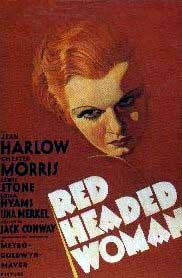- Red-Headed Woman
Infobox Film
name = Red-Headed Woman

image_size = 180px
caption = Poster
director = Jack Conway
producer =Paul Bern
writer =Anita Loos Katherine Brush
narrator =
starring =Jean Harlow Chester Morris
music =
cinematography =
editing =Blanche Sewell
distributor =Metro-Goldwyn-Mayer
released =June 25 1932
runtime = 79 min.
country = USA
language = English
budget =
preceded_by =
followed_by =
website =
amg_id = 1:40687
imdb_id = 0023385"Red-Headed Woman" is a 1932 film of the
Pre-Code era, produced byMetro-Goldwyn-Mayer , based on a novel byKatherine Brush , and with ascreenplay byAnita Loos . It was directed by Jack Conway. It starsJean Harlow andChester Morris .Plot
Lilian 'Lil' Andrews (Jean Harlow wearing a red wig) is a young woman who will do anything to improve herself. She seduces her wealthy boss William 'Bill' Legendre Jr. (Chester Morris) and cleverly breaks up his marriage with his loving wife Irene (
Leila Hyams ). Irene reconsiders and tries to reconcile with Bill, only to find he has married Lil that day.However, Lil finds herself shunned by high society, including Bill's father, Will Legendre Sr. (
Lewis Stone ), because of her lower class origins and homewrecking. When Charles B. Gaerste (Henry Stephenson ), a nationally known coal tycoon and the main customer of the Legendres' company, visits the city, Lil thinks she has found a way to force her way into the highest social circles. She seduces him, then blackmails him into throwing a party at her mansion, knowing that no one would dare offend him by not showing up. It seems like a social coup for Lil, until her hairdresser friend and confidante Sally (Una Merkel ) points out that all the guests have left early to attend a surprise party for Irene (who lives across the street).Humiliated, she decides to move to
New York City , even if it means a temporary separation from her husband. Will finds Lil's handkerchief at Gaerste's place and correctly guesses what Lil has done. He shows his evidence to his son, who hires detectives to watch Lil. They find that she is conducting not one, but two affairs, with Charles and his handsome Frenchchauffeur Albert (Charles Boyer ). Bill shows Charles damning photographs.When Lil learns that Charles has found out about her, she returns to Bill, only to find him with Irene. Furious, she shoots him, but he survives and refuses to have her charged with attempted murder. However, he does divorce her and remarry Irene.
Two years later, he sees her again, at a racetrack in
Paris , in the company of an aged Frenchman. He discreetly hides Irene's binoculars. In the final scene, Lil and her elderly companion get into a limousine ... driven by Albert.Cast
*
Jean Harlow as Lilian Andrews Legendre
*Chester Morris as William Legendre Jr.
*Lewis Stone as William Legendre Sr.
*Leila Hyams as Irene Legendre
*Una Merkel as Sally
*Henry Stephenson as Charles B. Gaerste
*May Robson as Aunt Jane
*Charles Boyer as Albert
*Harvey Clark as Uncle FredProduction
The film proved difficult from its inception. Producer
Irving Thalberg was concerned that the original story and the first draft of a script byF. Scott Fitzgerald were too serious, and offered the job of rewriting it to Anita Loos, instructing her to provide something that was more fun and playful and with a greater emphasis on comedy. After a complete rewrite of the script he was happy with its tone, and the film was made. Prior to its release he worked with the Will Hays Office to ensure it would receive approval for general release. Under theProduction code , a criminal could not be seen to profit from the crime, or to go unpunished. Sin must also be punished, even if the sin committed was not actually criminal. Adding further to the problem was Harlow's overtly sexual portrayal, with several scenes in which she was partially undressed, or making obvious sexual advances.Although the Hays Office could not ban a film as such, a refusal to issue approval for a particular film could lead exhibitors to refuse to screen it. Thalberg agreed to seventeen cuts to enable it to screen in the United States; however upon release, it still received a large number of complaints from affronted cinema patrons. It was banned in the
United Kingdom .The furor surrounding its release generated considerable publicity, and the film was a box-office success, and ensured the commercial viability of Harlow's upcoming releases. "Red-Headed Woman" was one of the films that led directly to a tougher moral code that was introduced in
1934 and remained in force until1968 .External links
*imdb title|id=0023385
*tcmdb title|id=1046
*amg title|id=1:40687
* [http://randomshelf.blogspot.com/2006/12/profile-and-review-forbidden-hollywood.html "Profile and Review: Forbidden Hollywood", Review by J.C. Loophole, The Shelf]
Wikimedia Foundation. 2010.
